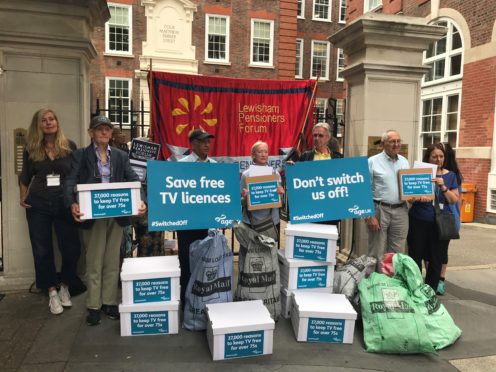Over-75s face home visits by BBC “outreach” teams to ensure they pay their TV licensing fees from next year, the corporation’s director of policy has told a Commons select committee.
From June next year, the benefit will be restricted to over-75s who claim pension credit, with the BBC saying it cannot afford to take on the financial burden from the Government.
The BBC’s Clare Sumner told MPs on the House of Commons Digital, Culture, Media and Sport Committee that the visits would be done “as sympathetically as possible”.
“We are actually recruiting a specific group of people who will pay support visits to this group with the intention of helping them understand what the system is and how to apply,” Ms Sumner said.
“Now that will be a different cohort of people to I think what’s called ‘enquiry officers’ who are the ones who kind of enforce the licence fee.”
SNP MP Brendan O’Hara then asked Ms Sumner if she thought that such visits would be “pretty traumatic” for older people.
Ms Sumner replied: “They won’t be coming to your door in quite the way you imply.”
She added that over-75s would first be notified in two letters that the free universal concessions were ending, with the BBC also offering telephone and face-to-face support.
Earlier, the BBC’s director-general said he initially described the Government’s decision to hand the corporation responsibility for free TV licences for over-75s as “nuclear”.
Lord Hall told the committee on Wednesday that the BBC took on the policy “unwillingly” and had “no choice” but to end the concession.
Giving evidence, he said he first heard about the decision during a call with then-Culture Secretary John Whittingdale.
Tune in this afternoon from 2.30pm 👇 https://t.co/8yPNdVdWg0
— Digital, Culture, Media and Sport Committee (@CommonsCMS) July 17, 2019
Mr Whittingdale told him he had “lost the argument over the weekend” and that the BBC would have to take over responsibility for the fee.
Lord Hall said he had replied “Well, that’s nuclear”, before laying out “the consequences of that decision”.
The free TV licence was introduced in 2000, but the BBC agreed to take on the cost as part of the charter agreement hammered out in 2015.

Lord Hall also said he “refutes and resents” the idea the corporation is not honouring its agreement with the Government over free TV licences for the over-75s.
He said the corporation has been “completely consistent about the reforms we would need to make to live with the budget means we were set”.
He stressed that from the beginning, it has been the Government which is “withdrawing the concession”.
Discussing the value of the concessions the BBC was given as part of the charter agreement, including an increase to the licence fee, committee chairman Damian Collins MP suggested they were worth “about £700 million”, adding “it seems you’re net gainers from this process”.
Lord Hall added that it had been “made absolutely clear” he had “no option” but to accept the deal.
“This was coming to us whether we wanted it or not,” he said.
“This was a new Conservative Government with a majority, coming in fresh with the success of that election – this was coming our way, come what may.”
He added that the BBC “absolutely did not” sell over-75s “down the river”.
Dame Helen Mirren, Sir Lenny Henry, actress Amanda Redman and Gogglebox star June Bernicoff are among 20 celebrities who have signed an open letter urging the next prime minister to restore free TV licences for all over-75s.
